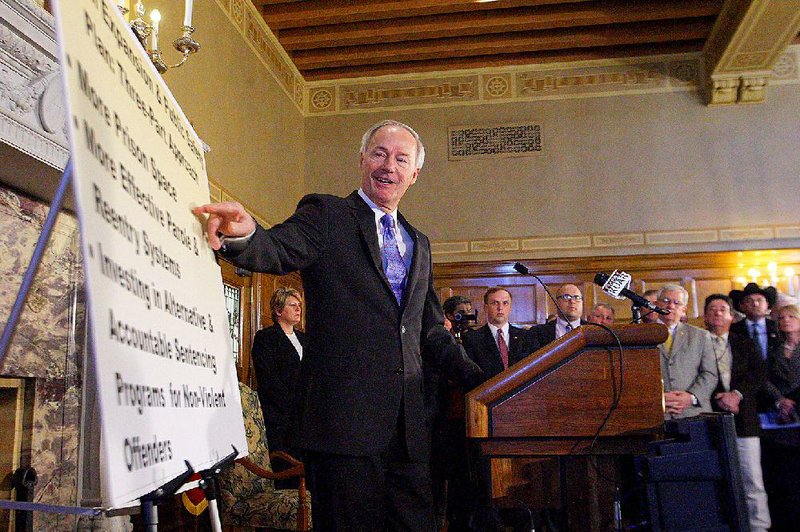Facing crowded prisons and a strained parole system, Gov. Asa Hutchinson rolled out a three-pronged strategy Wednesday to find immediate bed space for state prisoners while also investing in parole and court strategies meant to curb prison populations in the long run.
Instead of pushing for a 1,000-bed, $100 million prison to help address the crowding in state prisons and county jails, Hutchinson pitched a package that costs more than $32 million over the next two fiscal years that would increase the number of beds for inmates and improve parole services designed to deter recidivism.
The plan would yield another 790 beds for state inmates, increase parole staffing levels, and would pay for 500 beds for soon-to-be parolees at regional "re-entry centers" run by state parole officials. Inmates would undergo training and treatment there.
"We have backups in our county jails which results in a public safety issue for our court systems, whenever we're not able to retain those who pose a significant [threat if not held in jail]," Hutchinson said. "It's really backed up our system. It cries for immediate relief and a long term solution."
With $50 million in needs for expanding bed space, and another $14 million for parole and alternative sentencing, Hutchinson said the changes' ultimate costs will reach $64 million during his first term, officials said.
The first two years of it will be paid with about $31 million from state insurance reserves. Additional dollars would come from unclaimed property funds, the governor said.
The Arkansas Insurance Department keeps about three years of reserves on hand and additional funds are returned to the state's general revenue fund. The unclaimed property funds are expected to yield about $2.5 million, according to state budget officials.
Prison rolls have swelled since the summer of 2013. More stringent parole policies led to a boom in parole revocations, which contributed greatly to a 17 percent overall increase in prisoners in 2014, which Hutchinson said was one of the highest in the nation.
That boom in prisoners had a ripple effect, filling county jails with prisoners waiting for beds at a state facility. On Monday, the prisons held 15,341, or 107 percent of their 14,331-inmate capacity.
There were 2,631 state prisoners being held in county jails, a figure that has hovered around 2,500 for the last year.
Prison Beds
The first, and most immediate concern, Hutchinson said, was finding bed space.
At the start, the state would contract with the Bowie County jail in Texarkana, Texas to take on 288 beds at the cost of $36 per inmate per day, more than the $30 the state is paying local jails to house inmates but far less than the state prison average per day, which runs at about $60 per inmate.
The state would move to open 48 beds at the work center in Pine Bluff as well as 76 beds at other facilities. It would be able to open up the already existing but unfunded 178 beds at the Ester Unit in Pine Bluff by Dec. 31.
The plan also includes finding 200 beds by creating a partnership with counties to create regional jails where the state would have to contract with counties.
Hutchinson first mentioned his interest in a regional jail system on Feb. 9 and said that the state of Mississippi has had much success in a partnership between the state and counties in curbing crowding at state prisons.
If no counties opt in, Hutchinson said, the money set aside for that would go to finding other alternative bed space.
Asked how long it would take to tell if his plan -- a mix of increasing prison space and expanding parole services -- is working, Hutchinson said that the changes have to change the culture of criminals.
"I would think it would take a couple of years to have any meaningful statistics [showing improvement]. What you'll see first is hopefully some pressure relieved from county jail facilities... Within 90 days or 120 days we'll have our re-entry beds open up. That's going to relieve some pressure," Hutchinson said. "It will take a couple of years to measure whether we're changing [criminal] behavior and if we're not, you'll see the metric grow in terms of our prison population."
Community Corrections
Hutchinson said that finding space is only part of the solution. The other, he said, is making sure offenders, once paroled, don't come back.
"In 2014, there were 10,000 inmates released from prison on parole. That increase in case load has crashed our parole system, it has resulted in less accountability for our parolees," Hutchinson said. "Just look at a [average state] recidivism rate of 43 percent, that if 4,300 of those inmates return to prison over the next three years, that's a cost of $9.5 million. If we reduce that rate of repeat offenders, then we save money and increase public safety."
Hutchinson wants to give the Department of Community Corrections an additional $7.5 million in the next two years to pay for 52 new parole officers, support staff and treatment specialists.
He also wants to put an additional $5.5 million into funding a new system for parole re-entry centers, an approach that has yet to be tried in Arkansas.
"If you leave prison, you get a hundred dollars and a bus ticket. That's really not gonna help reduce repeat offenders from going back in," Hutchinson said. "They need an opportunity and the re-entry center will help them find their way back into society."
The Department of Community Correction got approval from the Legislature Wednesday to take state prisoners within 18 months of their release date into a re-entry program center for a 6-month program that would range from job training to anger management and substance abuse treatment courses.
Sheila Sharp, the head of the state's parole agency, said the funding asked for by Hutchinson would fund about 500 beds in re-entry centers around the state.
"We want them to have an opportunity to succeed in the community they come from ... education, job development, work on their social skills, family reunification and get them a job," Sharp said. "That way they're not going back to the elements without a job and rely on their anti-social skills."
The centers will be privately run and will contract with the state, Sharp said, but parole officials said that agency administrators would provide oversight.
Instead of costing tax payers about $60 a day to keep an inmate in prison, the re-entry centers will cost half that, and will be targeted toward offenders with medium or high risks to reoffend because, as Sharp said, they are the most in need of job training and other life skills.
Of the 52 new hires, Sharp said about nine will be drug and alcohol treatment coordinators who will work with parolees to enroll in treatment programs once they're released from the state.
Sharp said that about 82 percent of the state's prison and parole population requires some sort of substance abuse treatment.
"I don't know if Arkansas has ever implemented anything this comprehensive," Sharp said.
Included in his proposal is about $2.8 million in grants for alternative sentencing programs, like drug or veterans courts.
That comes out to about $100,000 for every one of the state's judicial districts, Hutchinson said, which he said will increase sentencing alternatives rather than simply sending an offender back to prison.
"It's a significant opportunity for the state of Arkansas and a very substantial investment tax payers will make to increase public safety but also change behavior [and] increase accountability and make sure we're not building more and more prisons over the next decade," he said.
Reception among Chambers
Republican leadership in both the House and Senate, as well as Democrats, expressed interest in Hutchinson's proposals but said there would be much work to do to turn thought into action.
Speaker of the House Rep. Jeremy Gillam, R-Judsonia, said it's hard to say if Hutchinson's proposal would move as quickly through the chambers as did the governor's tax cut and private-option proposals, but he said he expected it would get broad support.
"I think it's a great balanced approach to a problem that has a lot of complexity to it," Gillam said. "I think [Hutchinson] was very clear on the face that it will be fluid and that we will work through all of those complexities and it won't be just one action taken this session to solve all the problems."
In a statement released Wednesday, House minority leader, Rep. Eddie Armstrong, D-North Little Rock, said Hutchinson's plans were promising but said that tackling recidivism is more than taking on criminal justice officials.
"[We] look forward to providing our own input and ideas on how we can begin to restructure our criminal justice system to better keep violent offenders off the street... and provide non-violent and drug offenders a path to become contributing members of our communities," Armstrong said.
Senate President Pro-Tempore, Jonathan Dismang, R-Searcy, said the legislation could take more time than past packages pushed by the new governor.
"I hope that we do work quickly but I'll also say we have a number of legislators working [on other criminal justice measures]," Dismang said. "How long it takes to get all of those across the finish line, I'm not sure but I think it's a bit more complex because there are certainly more moving parts than a single tax cut bill or a single task force bill."
Sen. David Sanders, R-Little Rock, said the plan is a great first step. Asked if he thought proposed changes to parole, including the use of private groups to help transition parolees back into society, would work, Sanders said it's worth trying.
"We'll certainly find out [if they're effective]... Anything we do from a criminal justice standpoint is going to be measured. We're going to see if it works. If it doesn't work, we'll pivot and we'll do something else," Sander said. "We have seen our crime rate increase, particularly here in central Arkansas. We need more space. I appreciate that [Hutchinson] has put forward a flexible plan that is extremely cost efficient, especially when compared against what the predominant plan was which was to build a new prison facility."
Sen. Jeremy Hutchinson, R-Little Rock, chairs the Senate Judiciary Committee and said he would file enacting legislation today consistent with the governor's proposed package.
By increasing parole services and providing more prison space, Sen. Hutchinson, who is the governor's nephew, said the plan has much promise.
"Our biggest failing in our state' criminal justice system has been our parole and probation systems. It's not that judges are oversentencing or prosecutors are overcharging... it's that [offenders] recycle through the system," the senator said. "Finally we'll have a system that works and we'll begin to see a reduction in recidivism."



